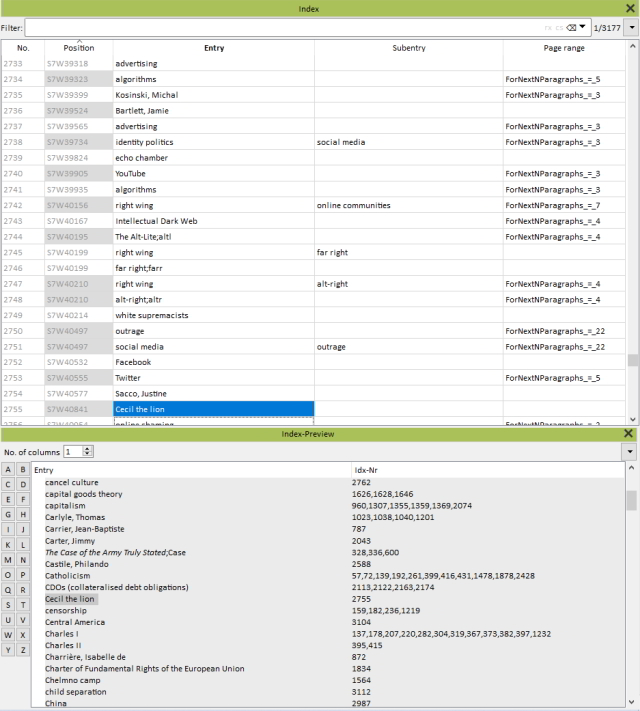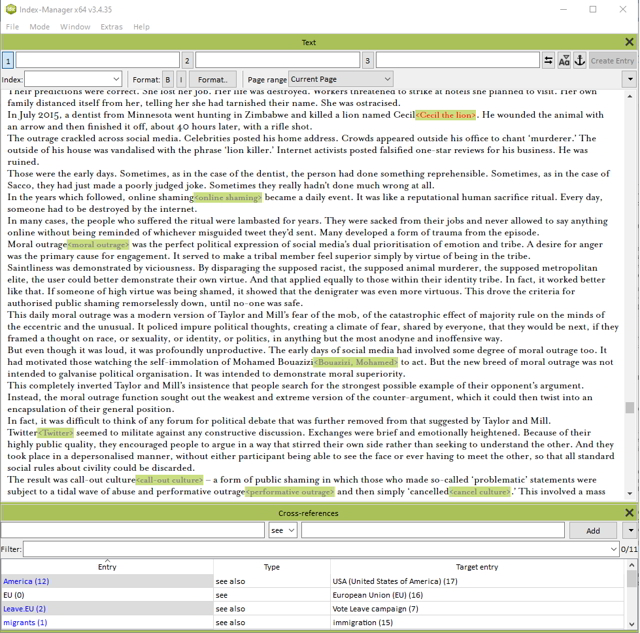 What does a typical week as a book indexer involve? I have been an editorial freelancer for two decades, originally as a proofreader and copyeditor, and now primarily as a book indexer, after training with the Society of Indexers (SI). I like being an Advanced Professional Member of both the CIEP and SI. I also love the variety of the job, but here is a glimpse into a typical working week as a book indexer.
What does a typical week as a book indexer involve? I have been an editorial freelancer for two decades, originally as a proofreader and copyeditor, and now primarily as a book indexer, after training with the Society of Indexers (SI). I like being an Advanced Professional Member of both the CIEP and SI. I also love the variety of the job, but here is a glimpse into a typical working week as a book indexer.
My week as a book indexer
Monday
I’m at my desk for 9.30 as I try to keep a working routine of pretty normal office hours. I worked from home already, and luckily that hasn’t had to change much this year.
Today I’m starting a new index. This job is unusual in that I also did the proofread for it, so I have had one good read over it before I start the index. If I come to an index fresh, I tend to do an initial skim-read of the book to begin understanding its content and structure.
Another different aspect is that this job is in InDesign. For a normal back-of-the-book index, I would work from a PDF of the page proofs on the left of my screen, and SKY Index software on the right. However, this publisher prefers an embedded index in InDesign. This has its own indexing facility, but I prefer to work with the Index-Manager program, which imports the InDesign text and allows you to build and edit the index properly while embedding the entries in the text.
A good start is made, considering that the first day is always slowest. To index, I start at page 1, line 1, and read and input entries as I go along. (Yes, we do have to read the whole book.) I consider the readers’ needs as I do this and the ‘aboutness’ of the book. What is this chapter/page/paragraph about? I add possible subheadings to large entries that will need breaking down further. The software sorts all this into alphabetical order as I input. I do not add page numbers for an embedded index, as these are automatically generated by anchoring entries at the correct point in the text.
In the afternoon, I hear back from another indexing job. The typesetter had a few minor queries for the author, which they check with me. I soon resolve these and that index goes to print. I am often commissioned by authors and I think this can work better than the traditional publishing scenario where book indexer and author have no contact.
I down tools at a reasonable hour and assess how much I’ve done so far, and how long it might take to finish. This book is a history of liberal thought. I’ve input entries for the introduction and first two chapters today and I’m only up to the end of the English Civil War. It’s going to be a long week.
Tuesday
An early start for a full day of inputting entries. I want to get another four chapters done today so I need to focus.
I make sure to take regular breaks. I use an online Pomodoro timer, so focus for 25 minutes, take a five-minute break, and repeat, with a longer break every two hours. In my breaks, I might go on Twitter, which is my preferred social network. There are many book indexers, editors, authors and publishers on there, and I have sometimes got indexing work directly through Twitter contacts. I’ll either peruse some tweets or look at the CIEP or SI forums for some freelance chat.
I receive an email offer of a future indexing job, but it’s for a busy time and it pays a poor rate, so I don’t pursue this further. I stay on some of these freelance lists as a cushion if nothing else turns up, but something invariably does.
It’s a day of revolutions in the reading: Glorious, American and French. Lots of names for sorting out, and a couple of love stories too: between Benjamin Constant and Madame de Staël (quite an eye-opener), and between John Stuart Mill and Harriet Taylor. Some of these entries will need to be like mini-biographies in themselves, covering early life, relationships, theories, works, etc. I’ll reconsider these at editing stage.
I’ve done the four chapters as planned and I’m on track. Hoping for similar tomorrow.
Wednesday
Onwards with more of the same. Having already proofread the book, I know that there is some difficult material coming up, though, including world wars and the Holocaust. It’s all written well, and so important to include, but the content is obviously horrific. I index this as professionally as I can, but I’m relieved to finish those chapters. I take a good break after this and head out for a walk.
On return, I am offered a job by a regular client to update a previous index I did for them. The author has written some additional chapters, so I will need to proofread this material, index the extra chapters and incorporate the new entries into the index (much easier with proper indexing software). I’m happy to do this, the publisher is pleased (as it’s less time and less money than a full index), and I agree to take it on.
The afternoon indexing is an easier session – on post-war rebuilding, including the theories of Hayek and Keynes; quite a lot on national identity, particularly seen through Isaiah Berlin and George Orwell; the Cold War, Thatcher and Reagan; and general post-war economics, up to the 2007/08 financial crisis. It’s a wide-ranging book, this.
Another four complete chapters done today: good. Ten down, four to go.
Thursday
I aim to reach the end of the inputting today and make a start on the editing. During the day, my reading covers, among other things, identity politics, cancel culture, migrant boats, Brexit and Trump. Quite a combination.
I do finish inputting early in the afternoon. The last indexable page occurs earlier than the last proofreadable page, as we don’t generally index the acknowledgements or references/bibliography sections, and endnotes are only indexed if they contain significant information.
And so the editing stage begins. I generate the index in a copy of the InDesign file and put it into the desired format (usually two columns in a smaller font than the main text). I can then see how long the ‘raw’ index is, and how much editing I have to do. The unedited index is 40 pages, and the publisher wants it to be 20 pages maximum. This should be fine. I go back into Index-Manager, as its editing facilities are superior.
I pick out some easy edits today – mainly removing unnecessary subheadings where the main entry only has about six page numbers. This starts saving a lot of space, as an entry with subentries over several lines can be quickly made into a main entry of one or two lines.
As I’m where I wanted to be, I decide to clock off and tackle the editing with fresh eyes and a rebooted brain in the morning.
Friday
Up with the lark and raring to go. The editing stage is when the index properly takes shape and where a lot of the thinking work is done. On this pass, I start from the ‘A’ section and look at each entry, considering whether it should stay in (if not, out it goes, or it’s marked as a potential deletion) and if it is correct or needs some work.
I made some notes to self while inputting – marking with tags such as ‘??’ when there’s something to look at again. At the end, I search for these to make sure I have resolved them all.
I see some unusual entries, which I try to retain, as it makes for a more interesting index. Here are entries such as ‘sans-culottes’ and ‘shit lists’. The former will stay. The latter could come out, but as this author is renowned for their colourful language, I feel it’s fair game. I’m also keeping ‘Cecil the lion’, because he’s worth it.
 An entry with many subheadings will take the longest time to sort. Are all the subheadings needed? Can some be combined with others? The main characters in the book are in this category. The same goes for concepts (eg doubt, freedom, identity, liberty, truth, will) and ‘-isms’ – communism, fascism, individualism, nationalism, socialism, etc. This is the bulk of what the book is ‘about’, so it’s important that these work.
An entry with many subheadings will take the longest time to sort. Are all the subheadings needed? Can some be combined with others? The main characters in the book are in this category. The same goes for concepts (eg doubt, freedom, identity, liberty, truth, will) and ‘-isms’ – communism, fascism, individualism, nationalism, socialism, etc. This is the bulk of what the book is ‘about’, so it’s important that these work.
I often leave the ‘metatopic’ entry – the subject of the whole book – till the end. Some say that this should not have an entry at all, as everything relates to it, but I do tend to include one as a basic overview. The metatopic here is ‘liberalism’, so I deal with this entry last.
After working through the entries from A to Z, I regenerate the index in InDesign to check for length. It’s 18 pages, so I’m happy with that. I now print out the index for a final proofread (using proper proofreading marks). I spot different things on hard copy, and it gives me a better feel of the reader experience of the index.
I make any tweaks and generate the final index. One last check and I submit the whole proofread and indexed InDesign file to the publisher, with index entries embedded in the text and a generated index list at the end.
Then I await index approval before submitting my invoice. An author may request minor changes, which the book indexer should amend, as they understand the index structure and how other entries might be affected. In this case, I’m glad to hear that author and publisher are happy with the index, and off the book goes to press.
So, there is a fairly typical week in the life of this book indexer. I love my job and I feel lucky that I can disappear into a good book every working day. I have seen the joy of indexing being compared to a word game or jigsaw. It is most satisfying to figure out the best index solution for each book. Next week will be a different puzzle again.
 Paula Clarke Bain is an Advanced Professional Member of the Society of Indexers and the Chartered Institute of Editing and Proofreading. She tweets as @PC_Bain and her website (with comedy book indexes blog) is www.baindex.org. Find the Society of Indexers on Twitter @indexers and www.indexers.org.uk.
Paula Clarke Bain is an Advanced Professional Member of the Society of Indexers and the Chartered Institute of Editing and Proofreading. She tweets as @PC_Bain and her website (with comedy book indexes blog) is www.baindex.org. Find the Society of Indexers on Twitter @indexers and www.indexers.org.uk.
Photo credit: calendar – Emma Matthews Digital Content Production on Unsplash
Proofread by Andrew Macdonald Powney, Entry-Level Member.
Posted by Abi Saffrey, CIEP blog coordinator.
The views expressed here do not necessarily reflect those of the CIEP.


What a finely crafted process. I had no idea, and now have a newfound respect for indexers and indexing. If ever I find myself tempted to cut corners I’ll return to this.
Thank you for this very personal diary that reveals so much about how indexers work. I learned a lot about the process, but want to know even more!
Thank you, Paula, for this fascinating post. I have just started to work my way through the Indexing Basics Workshop from the SOI and am now even more interested to delve further.
Absolutely fascinating. As a researcher, I rely so much on the index. Thank you.